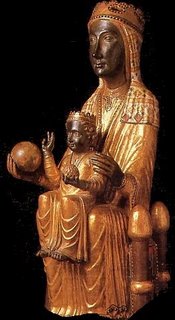YEWA / NOSSA SENHORA DE MONSERRATE

No sincretismo afro-catolico cubano, santeria, o orixa femino Yewa esta associado a Virgem Negra de Monserrate
.
Yewa is a very severe and reclusive orisha, intimately linked
to death. She is the personification of purity and character.
It is believed that this is the orisha that watches over the
cadaver when it is laid to rest. Although closely related with
maritime affairs, she is worshipped in the cemetery, the river,
and the lagoon. Her favorite offerings are flowers,
particularly fragrant ones, and in Lukumí lore is considered to
be the most beautiful and coveted flower in Oduduwa’s garden,
whom Shango eventually seduces and “disgraces.”
Many priests claim that in Yorubaland Yewa was worshipped
within a cave that could only be reached by swimming across the
lagoon she presided over along with Olosa, orisha of the
lagoon. She is described as an Amazon-like queen, forbidding
sexual contact for her worshippers. Her court was attended by
eunuchs under the supervision of Logun Ede.
Yewa is the Orisha who lives in the depth of the cemetery and
symbolizes the final resting place if the dead.
The virgin Yewa became pregnant by Shango, one of the Orisas
(possibly Boromu) convinced her to take herbal remedies to
"abort" the child naturally, when she did, reluctantly, she
buried the remains under a tree and brokenhearted she exiled
herself to the realm of the dead. With that Boromu went off to
tell her father Olofin what Yewa had done, and took him to the
very spot under the tree where she had buried her child.
Horrified, Olofin went immediately to the spot where the
child's remains were buried and unearthed his grandchild,
Borosia....this is why they call, the Orisa of Oddua's court
Brosia or Borosia (and guardian of Oddua's palace), the missed
abortion of Yewa...
In traditional Yoruba culture there were no "grave yards," the
dead were buried in graves that are partially in the compound
and pass under the wall of the house to be partially in the
house. Yewa, is in and represents the grave it self, (the worms
and internal parasites that consume our flesh are Yewa).
to death. She is the personification of purity and character.
It is believed that this is the orisha that watches over the
cadaver when it is laid to rest. Although closely related with
maritime affairs, she is worshipped in the cemetery, the river,
and the lagoon. Her favorite offerings are flowers,
particularly fragrant ones, and in Lukumí lore is considered to
be the most beautiful and coveted flower in Oduduwa’s garden,
whom Shango eventually seduces and “disgraces.”
Many priests claim that in Yorubaland Yewa was worshipped
within a cave that could only be reached by swimming across the
lagoon she presided over along with Olosa, orisha of the
lagoon. She is described as an Amazon-like queen, forbidding
sexual contact for her worshippers. Her court was attended by
eunuchs under the supervision of Logun Ede.
Yewa is the Orisha who lives in the depth of the cemetery and
symbolizes the final resting place if the dead.
The virgin Yewa became pregnant by Shango, one of the Orisas
(possibly Boromu) convinced her to take herbal remedies to
"abort" the child naturally, when she did, reluctantly, she
buried the remains under a tree and brokenhearted she exiled
herself to the realm of the dead. With that Boromu went off to
tell her father Olofin what Yewa had done, and took him to the
very spot under the tree where she had buried her child.
Horrified, Olofin went immediately to the spot where the
child's remains were buried and unearthed his grandchild,
Borosia....this is why they call, the Orisa of Oddua's court
Brosia or Borosia (and guardian of Oddua's palace), the missed
abortion of Yewa...
In traditional Yoruba culture there were no "grave yards," the
dead were buried in graves that are partially in the compound
and pass under the wall of the house to be partially in the
house. Yewa, is in and represents the grave it self, (the worms
and internal parasites that consume our flesh are Yewa).


1 Comments:
Interesting comments on Yewá. It's always good to quote your sources, seeing as there is so little information about this deity.
Enviar um comentário
<< Home